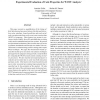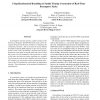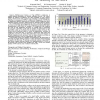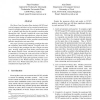214 search results - page 14 / 43 » Data-Flow Frameworks for Worst-Case Execution Time Analysis |
RTSS
2003
IEEE
14 years 27 days ago
2003
IEEE
This paper presents a quantification of the timing effects that advanced processor features like data and instruction cache, pipelines, branch prediction units and out-oforder ex...
VLSID
2002
IEEE
14 years 8 months ago
2002
IEEE
In preemptive real-time systems, a tighter estimate of the Worst Case Response Time(WCRT) of the tasks can be obtained if the layout of the tasks in memory is included in the esti...
VEE
2012
ACM
12 years 3 months ago
2012
ACM
Dynamic data flow tracking (DFT) deals with tagging and tracking data of interest as they propagate during program execution. DFT has been repeatedly implemented by a variety of ...
DATE
2009
IEEE
14 years 2 months ago
2009
IEEE
—Multiprocessor System on Chip (MPSoC) architecture is rapidly gaining momentum for modern embedded devices. The vulnerabilities in software on MPSoCs are often exploited to caus...
WORDS
2002
IEEE
14 years 16 days ago
2002
IEEE
The Worst-Case Execution-Time Analysis (WCET Analysis) of program code that is to be executed on modern processors is a highly complex task. First, it involves path analysis, to i...



